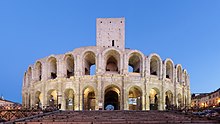
Back مسرح روماني Arabic Amfiteatr Azerbaijani Амфітэатр Byelorussian Амфитеатър Bulgarian Amfiteatr Breton Amfiteatar BS Amfiteatre Catalan Amfiteátr Czech Amffitheatr Welsh Amfiteater Danish

An amphitheatre (British English) or amphitheater (American English; both /ˈæmfiˌθiːətər/)[1][2] is an open-air venue used for entertainment, performances, and sports. The term derives from the ancient Greek ἀμφιθέατρον (amphitheatron),[3] from ἀμφί (amphi), meaning "on both sides" or "around"[4] and θέατρον (théātron), meaning "place for viewing".[5][6]
Ancient Greek theatres were typically built on hillsides and semi-circular in design. The first Greek amphitheatre may have been built at Pompeii around 70 BC.[7]
"The amphitheater (amphitheatrum) is so called because it is composed of two theaters, for an amphitheater is round, whereas a theater, having a semicircular shape, is half an ampitheater." - Isidore of Seville, Etymologies, XV.ii.26–ii.40 307[8]
Ancient Roman amphitheatres were oval or circular in plan, with seating tiers that surrounded the central performance area, like a modern open-air stadium. In contrast, both ancient Greek and ancient Roman theatres were built in a semicircle, with tiered seating rising on one side of the performance area.
Modern parlance uses "amphitheatre" for any structure with sloping seating, including theatre-style stages with spectator seating on only one side, theatres in the round, and stadia. They can be indoor or outdoor.
Natural landforms and rock formations of similar shape are sometimes known as natural amphitheatres.

- ^ New Oxford American Dictionary (3rd ed.). Oxford University Press. 2010.
- ^ "Definition of Amphitheatre in Oxford dictionary. Meaning, pronunciation and origin of the word". Oxford Dictionaries. Oxford University Press. 2014. Archived from the original on 13 July 2012. Retrieved 23 February 2014.
- ^ ἀμφιθέατρον, Henry George Liddell, Robert Scott, An Intermediate Greek-English Lexicon, on Peseus
- ^ ἀμφί, Henry George Liddell, Robert Scott, A Greek-English Lexicon, on Perseus
- ^ θέατρον, Henry George Liddell, Robert Scott, A Greek-English Lexicon, on Perseus
- ^ Hoad, T.F. (1996). The Concise Oxford Dictionary of English Etymology. Oxford University Press. pp. 14, 489. ISBN 0-19-283098-8.
- ^ Grout, James. "The amphitheater at Pompeii". Encyclopaedia Romana. Retrieved 24 January 2024.
- ^ Isidore of Seville (July 2006) [625 AD]. Etymologiae [Etymologies] (in Latin). Cambridge University Press. pp. XVIII.52, XV.ii.26–ii.40, p.307. ISBN 9780521837491.
- ^ Michel Tournier, Le coq de bruyère, W. D. Redfern, Fairleigh Dickinson Univ Press, 1996, p. 69
© MMXXIII Rich X Search. We shall prevail. All rights reserved. Rich X Search